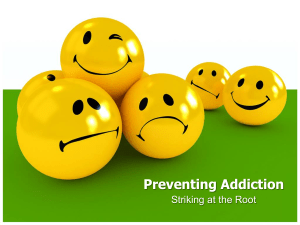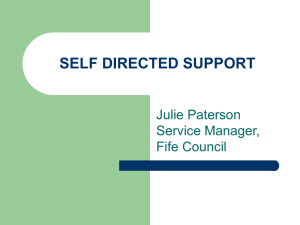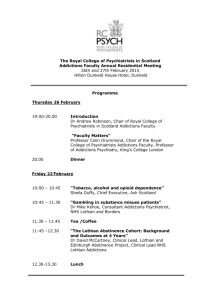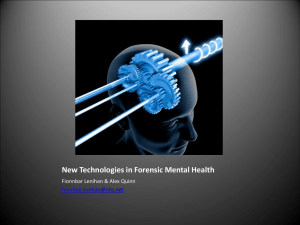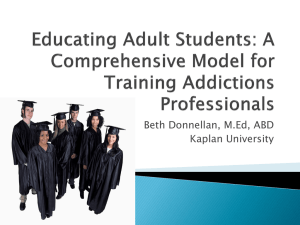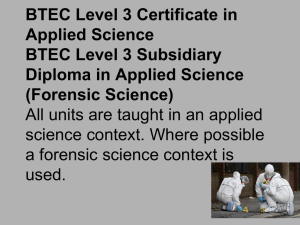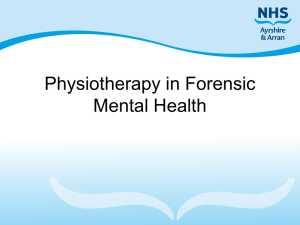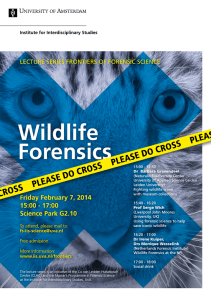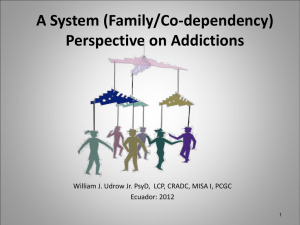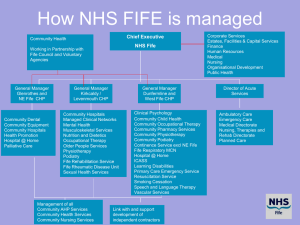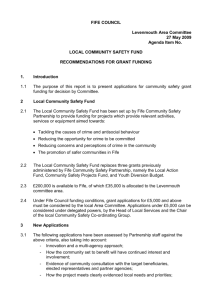S.E. Scotland Forensic Addiction Services
advertisement
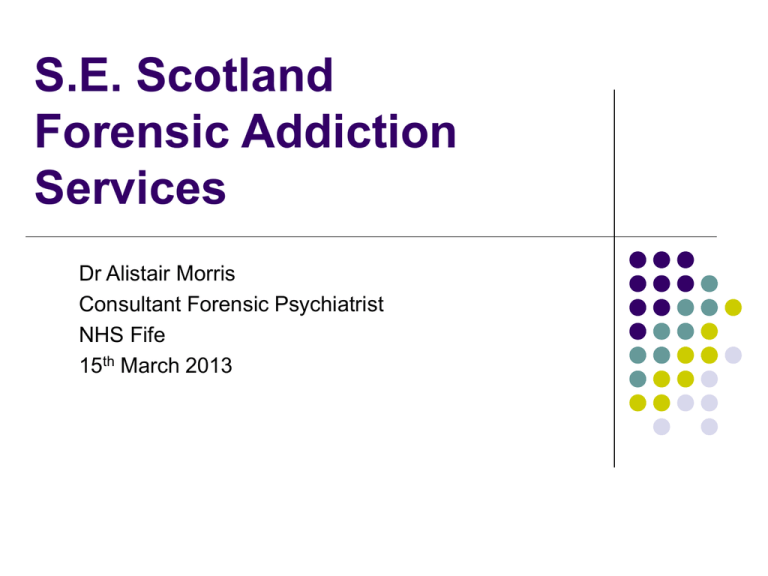
S.E. Scotland Forensic Addiction Services Dr Alistair Morris Consultant Forensic Psychiatrist NHS Fife 15th March 2013 Fife Elements of Fife wide service – overview Triage Assessment Established in 2007 Regular drop-in clinics throughout Fife staffed by third sector agencies. Designed to improve access into appropriate services for those seeking help with alcohol and/or drug problem Provides initial assessment to; establish which intervention or service would best suit an individual signpost or refer on to appropriate services/agencies including addiction services prison liberations, in order to reduce the risks of overdose and drug related deaths and streamline services, to ensure continuity of care. Individuals will be provided an appointment with 24-48 hours of liberation. Fife Addictions Services 2 Forensic Drug Treatment Team Work with patients on a court order at risk of custody Evidence of a direct link between their drug use and offending behaviour (thefts etc.) Intensive input by nursing staff Treatment plans same as CDS Progress discussed regularly with the sheriff Fife Addictions Services 3 1-1 individual sessions for motivational interviewing / relapse prevention Naloxone & overdose risk assessment and training. Community alcohol detoxification / assessment for tier 4 inpatient services Community drug detoxification / maintenance treatment for Opiate / benzodiazepine dependence. Public Health Nurse in Addictions – currently being reviewed, however there are link workers for child protection who have monthly core group meetings. Partnership working – work with 3rd sector agencies, providing psychological interventions and support and guidance. Other health professionals dealing with both mental / physical health needs. Forth Valley Tiered structure to addictions service – Criminal Justice Drug Treatment Service incorporating DTTO and Community Payback Order with addictions treatment requirements. This interfaces with; CADS (for complex drug/alcohol problems with concurrent complicating issues such as severe mental health problems /child protection concerns). Addiction Recovery Service - more stable caseload group, working actively towards recovery. Signpost Recovery and Addictions Support and Counseling - through which we access the community rehabilitation programme, and for transfers at the end of the Orders dependent upon the individual issues and the progress made during the Order. Occasional joint outpatient work between any of above Substance Misuse Services and forensic CMHS on a case by case basis where need dictates and shared cases via enhanced CPA. Forth Valley 2 Psychological therapies – Consultant Clinical Psychologist and an experienced trainee clinical psychologist within the substance misuse service. Pilot trauma group for women, joint with CMHT. This group is based on the Trauma, Recovery and Empowerment Model (TREM) and is part of a Scotland-wide research project. Specific work is also being undertaken with female substance misuse treatment clients, with at least one criminal conviction, who are participating in a study asking them about their experiences with social relationships in relation to their substance misuse and criminal behaviour. We work collaboratively with the prison medical staff around joint protocols and ways of working through the clinical governance prescribing subgroup but do not clinically 'in-reach' as such. Borders/Dumfries HMP Dumfries has an Addictions Nurse who assesses for alcohol and/or drug detox, dispenses methadone and other medications including Pabrinex. She also provides Take Home Naloxone training prior to release, harm reduction advice etc. 3 Through care addictions workers previously employed by Phoenix Futures, now TUPE'd to the NHS who cover the transition between prison and community. ADS alcohol counsellor (half time) who does 1:1 and group sessions. Smoking Matters do work in the prison re smoking cessation. Edinburgh NHS Lothian only have the Orchard Clinic medium secure unit (no low secure facilities or forensic mental health team) so most interventions outside Orchard Clinic might be termed 'non-forensic'. Within the Orchard Clinic forensic service, Psychology run a drug and alcohol group on a rolling basis which it is hoped most patients will be able attend at some point. Psychology also see people for individual drug and alcohol work as required. Outside of these forensic services, NHS Lothian has multiple resources that we can link in with. There are multidisciplinary drug and alcohol teams in local areas. (See attachment - This is a bit out of date but gives you the general shape of things). For severe cases there are detox services and a Residential Referral Team. This team is for people who have tried everything available in the community but continue to have major problems. They are put on a residential programme for several months designed to help them adjust to life without alcohol/drugs. It also encourages them to examine their past behaviour and manage their lives better. Edinburgh Lothian's & Edinburgh Abstention Project (LEAP) Semi-residential NHS Minnesota Model Drug & Alcohol Rehabilitation Unit Addiction as a stress induced bio-psycho social disease. Chemicals as midbrain solution. Prior to chemicals…behavioural defence mechanisms which are ….anti social!!!! Hence forensic!!! Treatment: Detox (remove chemicals) Cognitive behavioural change (dismantle defence mechanisms and develop healthy ways of functioning) – Group therapy; AA/NA meetings; “Stay out of jail group” 12 weeks to reinforce change Aftercare Mutual aid Recovery community Recovery house Abstinence not possible if behaviours are dysfunctional (forensic) Fin
